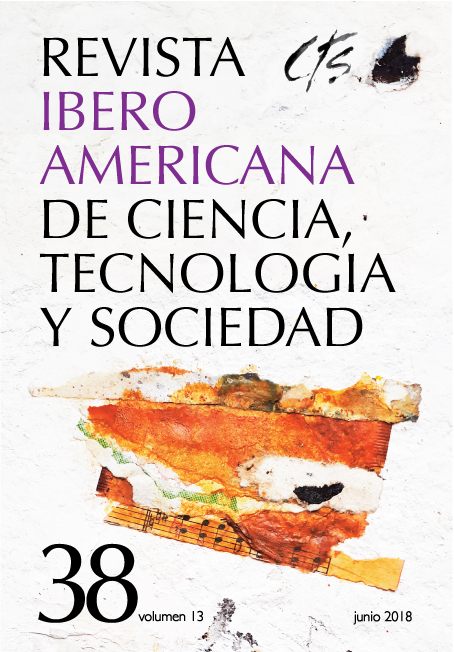Interdiscipline and Transdiscipline in the Face of Traditional Knowledge
Keywords:
interdiscipline, transdiscipline, traditional knowledge, knowledge society, innovation networkAbstract
The notions of inter and transdisciplinarity enable the introduction of the concept of traditional knowledge (TK) in relation to the idea of the knowledge society. This perspective allows establishing a connection between innovation, a dominant trait in this society, and TK. The entity where this relationship resides is the innovation network, interdisciplinarity and transdisciplinarity. The conceptual framework built describes the role that TK fills in this network and captures the tensions that it has been subjected to regarding its use, development and protection by the native peoples who are its custodians. This perspective is based both on the review of certain bibliographical records, as well as the experience acquired by the authors in the development and management of the action-research project: “Conservation, Development, Social Use and Protection of Traditional Knowledge and Resources in Mexico”, financed by the International Cooperation Fund between Mexico and the European Union for Science and Technology (2009- 2013).Downloads
References
ARGUETA VILLAMAR, A. (1988a): “Etnobiología y civilización mesoamericana”, México Indígena, n° 24, año 4, 2° época, pp. 17-23.
ARGUETA VILLAMAR, A. (1988b): Etnozoología P’urhé. Historia, utilización y nomenclatura P’urhépecha de los animales, tesis de licenciatura, Facultad de Ciencias, UNAM.
BARAONA, R. (1987): “Conocimiento campesino y sujeto social campesino”, Revista Mexicana de Sociología, n° 49, pp. 167-190.
BONFIL BATALLA, G. (1981): Utopía y revolución, México DF, Nueva Imagen.
BONFIL BATALLA, G. (1987a): México Profundo. Una civilización negada.
SEP/CIESAS, México DF.
BONFIL BATALLA, G. (1987b): “Teoría del control en el Estudio de procesos étnicos”, Papeles de la Casa Chata, CIESAS.
CUETO, M. (1995): Saberes andinos. Ciencia y tecnología en Bolivia, Ecuador y Perú, Lima, IEP ediciones, Estudios Históricos n° 19.
DEWEY, J. (1938): “Unity of Science as a Social Problem”, en O. Neurath, R. Carnap y Ch. Morris (eds): International Enciclopedia of Unified Science, vol. 1, n° 1, pp. 29-38.
ELLEN, R. F. (1986): “Ethnobiology, Cognition and the Structure of Prehension: Some general theoretical notes”, Elliot College Review, University of Kent at Canterbury, United Kingdom, vol. 6, n° 1, pp. 83-98.
FALS BORDA, O. (1981): “La Ciencia del Pueblo”, Investigación Participativa y Praxis Rural. Nuevos conceptos en educación y desarrollo comunal, Lima, Editorial Mosca Azul, pp. 19-47.
FALS BORDA, O. (1985): Conocimiento y poder popular. Lecciones con campesinos de Nicaragua, México, Colombia, Siglo XXI Editores.
FALS BORDA, O. (1987): Ciencia propia y colonialismo intelectual. Los nuevos rumbos, Bogotá, Carlos Valencia Editores, 3a. edición.
FEYERABEND, P. (1988): La ciencia en una sociedad libre, México DF, Siglo XXI Editores.
FOUCAULT, M. (1988): Las palabras y las cosas. Una arqueología de las ciencias humanas, México DF, Siglo XXI Editores.
FOUCAULT, M. (1992): “Curso del 7 de enero de 1976”, Microfísica del Poder, Madrid, La Piqueta Editores, 3a. edición, pp.125-137.
GIBBONS, M. et al. (1994): The New Production of Knowledge, Londres, Sage Publications.
GRUPO DE BARBADOS (1979): Indianidad y Descolonización en América Latina, México DF, Editorial Nueva Imagen.
GRÜNBERG, G. (1995): Articulación de la diversidad. Tercera Reunión de Barbados, Quito, Ediciones Abya Yala.
HERNÁNDEZ X., E. (1985): “La exploración etnobotánica y su metodología”, Xolocotzia, Chapingo, pp. 163-188.
HESS, CH. y E. OSTROM (2003): “Ideas, artifacts, and facilities: information as a common-pool resource”, Law and Contemporary Problems, vol. 66, n° 1–2, pp. 111–144.
LEFF, E. (1981): Biosociología y Articulación de las Ciencias, México DF, UNAM.
LEFF, E., ARGUETA, A., BOEGE, E. y GONSALVES, C. W. P. (2005): “Más allá del desarrollo sostenible: la construcción de una racionalidad ambiental para la sustentabilidad: una visión desde América Latina”, Revista Futuros, vol. 9, n° 3, Medio Ambiente y Urbanización, Instituto Internacional de Medio Ambiente y Desarrollo.
OSTROM, E. (2009): “Beyond Markets and States: Polycentric Governance of Complex Economic Systems”, Nobel Lecture, 8 de diciembre.
RIBEYRO, D. y GOMES, M. (1995): “Etnicidad y Civilización”, en G. Grünberg: Articulación de la diversidad, Quito, Ediciones Abya Yala, Tercera Reunión de Barbados, pp. 29-53.
RODRÍGUEZ, N. J. y VARESE, S. (1981): El pensamiento indígena contemporáneo en América Latina, México DF, DGEI, SEP.
TOLEDO, V. M. (1994): La Apropiación Campesina de la Naturaleza: Un Análisis Etnoecológico, tesis de doctorado, México DF, UNAM.
THRUPP, L. A. (1993): “La legitimización del conocimiento local: de la marginación al fortalecimiento de los pueblos del Tercer Mundo”, en E. Leff y J. Carabias (coords.): Cultura y Manejo Sustentable de los Recursos Naturales, México DF, Grupo editorial Miguel Angel Porrúa. Colección México: actualidad y perspectivas, UNAM, vol. 1, pp. 89-122.
VARESE, S. (1995): “Pueblos Indígenas y Globalización en el Umbral del Tercer Milenio”, en G. Grünberg: Articulación de la diversidad, Quito, Ediciones Abya Yala, Tercera Reunión de Barbados, pp. 123-159.
VILLORO, L. (1982): Creer, Saber, Conocer, México DF, Siglo XXI Editores.
WARREN, D. M. (1991): “Using Indigenous Knowledges in Agricultural Development”, World Bank Discussion Papers, Washington DC, The World Bank, n° 127.
Downloads
Published
How to Cite
Issue
Section
License
All CTS's issues and academic articles are under a CC-BY license.
Since 2007, CTS has provided open and free access to all its contents, including the complete archive of its quarterly edition and the different products presented in its electronic platform. This decision is based on the belief that offering free access to published materials helps to build a greater and better exchange of knowledge.
In turn, for the quarterly edition, CTS allows institutional and thematic repositories, as well as personal web pages, to self-archive articles in their post-print or editorial version, immediately after the publication of the final version of each issue and under the condition that a link to the original source will be incorporated into the self-archive.











